#Chinese terms
Note
Hey, so i have this random question: The word for 'gay' is 'cutsleeve' in ancient Chinese era.(idk if it's true irl or not in history). So are there any word(s) for 'lesbian' and 'bisexual'?
Cutsleeve is an actual historical term! It's from the ancient story of an emperor who cut his sleeve that his sleeping partner was laying on so he would not wake him up when he moved. Here's a few articles about it.
As for a word for lesbian, according to Wikipedia and a few other sites, "Lala (Chinese: 拉拉; pinyin: lālā) is a non-derogatory Chinese slang term for lesbian, or a same-sex desiring woman" this seems to be the word used most, if I am wrong please correct me.
I couldn't really find anything for the word bisexual, but I did find this article that might help a bit?
If anyone else has more info, or if I am wrong with anything, please let me know! ^^
- Mod C
Fun fact: in my research I found out that Baihe is the lesbian version of Danmei – "The female same-gender counterpart to danmei is known as bǎihé (Chinese: 百合; lit. 'lilies'), which is an orthographic reborrowing of the Japanese word yuri, but it is not as well known or popular as danmei."
---
batinaburnouse said: These two tumblr posts might be helpful? fouryearsofshades and audreydoeskaren
48 notes
·
View notes
Text
Chinese Terms Reflective of the Culture: 连累
Pretext: I love languages, especially the way they get influenced and shaped by the culture they’re born from. For example, the Inuits have 40-50 different words for snow, because they live in an environment with lots of snow! Snow is important to them as it’s such a strong presence in their day to day lives. You won’t find the same words mapped to English since the historically English speaking regions were less snowy.
Similarly, there’s a lot of Chinese terms that don’t have a parallel in the English language because the environment and society emphasize different things. If you watch cdramas, I’m sure you’ve come across them before. Although, whether or not it registered might depend a lot on the translation qualities. Here’s one I’ve thought about quite a bit:
连累 (lian lei) - To implicate, to involve someone else, to drag them into trouble with you would be a rough translation, but none of these fully captures the sentiment of this term.
This is an action, so you’d use it like ‘I (lian lei)’d you’. While ‘implicate’ is a singular word I used to translate, it’s missing out on so much. It doesn’t carry the same weight of guilt / accusation, nor does it capture the nuance that it was the association (as opposed to necessarily active involvement) that brought trouble in the end. The individual words that compose this are 连 which means ‘connect’ and 累 which means ‘tired / strain’.
When I hear a phrase like ‘I (lian lei)’d you’, it’s full of guilt, apology, and regret over, not so much the 'guilty’ action, but more over the fact that the other person was unfairly involved due to their association. You agonize over having accepted their kindness or friendship, and / or over not being capable enough to prevent your burden from having to be shared by them. The closest phrase I feel can compare is something like “I didn’t mean to involve you”, but it would have to be buffered by a lot of good prose. And conversely, it’s quite accusatory if you’re saying ‘You (lian lei)’d him’. You’re accusing them of being inconsiderate, naive, selfish, or all of the above.
And honestly, this sort of term only truly makes sense in Eastern / collectivist cultures, where your identity is first and foremost not of you as the individual, but your relation to the society. In Western cultures, people might think it unthinkable to punish family of someone for what someone did. But in Chinese culture, this was extremely prevalent. Even today, it persists in more nuanced ways. Responsibility means something different in Eastern vs. Western cultures, and this term reflects that.
110 notes
·
View notes
Text
I want to post this here too because I’ve seen it happen a few times
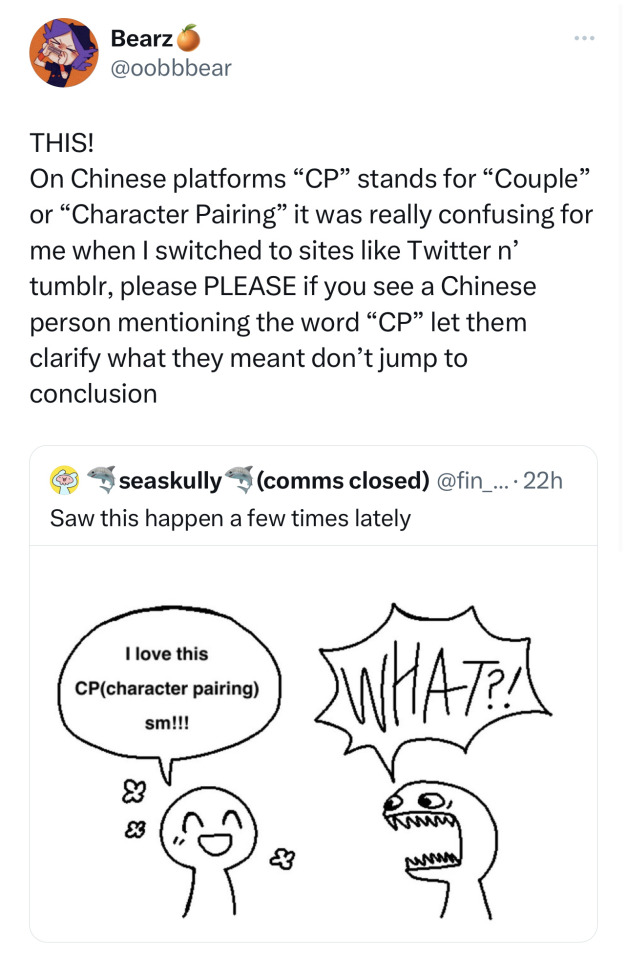
Please understand that there are cultural differences and language differences, if you see this happening let the person clarify what they meant, that person might just not be familiar with words the western side of the internet use
#bearz rambling tag#no it’s not really possible to let everyone who uses this term to change#because as far as I know this is the most common word with use on Chinese websites#I didn’t know that pairing are called ‘ship’ here#like why would I even know that#‘ship’ makes zero sense to me#it took me a while to learn the fandom language people speak here#it’s hard#give people time#shipping culture is very different too#Like on Chinese site you HAVE to clarify the Top and the Bottom of this ship in the ship name#it is very very important to them#people who like the same ship but with different Top Bottom preference will fight till no end#imagine how confused I was when I first got here#where there’s no top bottom differences#it’s not really a smut thing#it’s more a dynamic thing#AxB and BxA is very different#oh I can talk so much about the differences on fandom cultures#if ya are interested in more please feel free to ask#it’s very interesting to me#I wanna talk about it
8K notes
·
View notes
Text
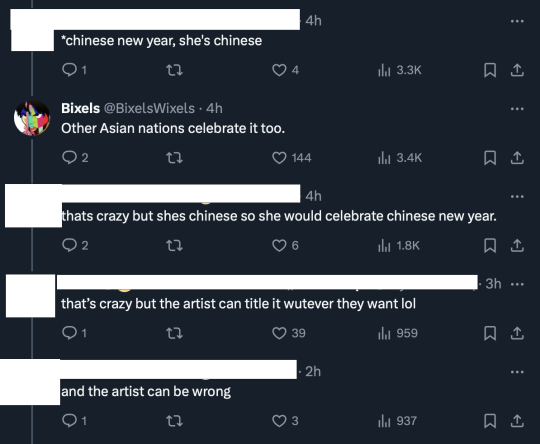
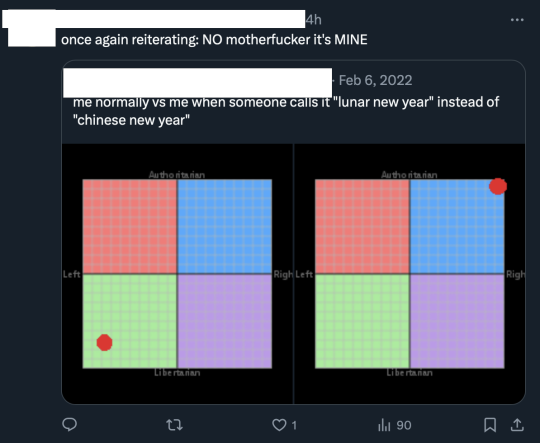
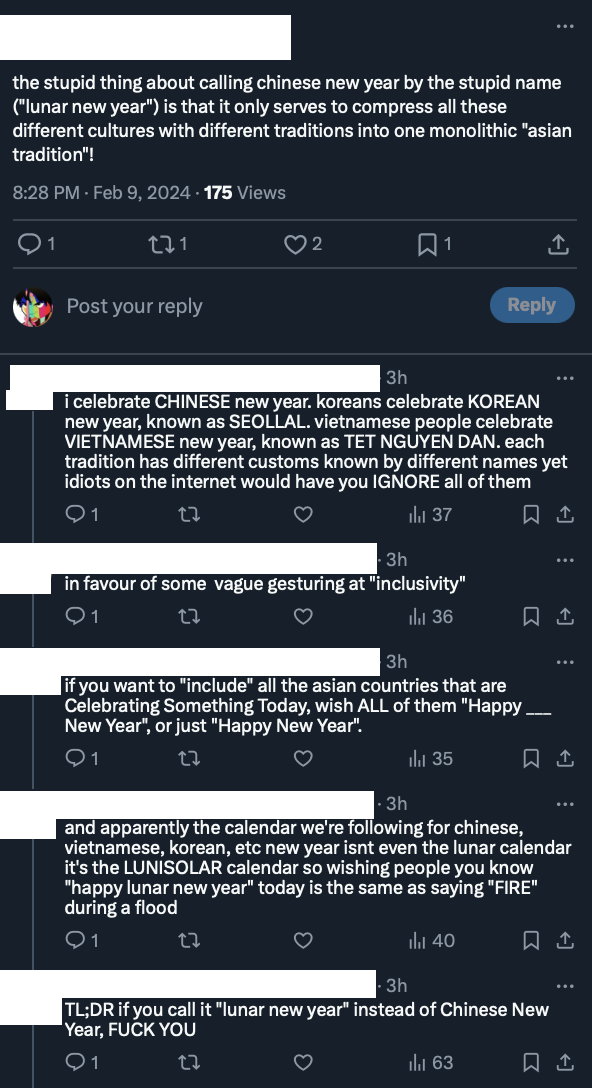
Jesus man, relax.
#this was in response to me saying “lunar new year” on the rarity art#personal#delete later#what in insane nonproblem to get this angry about#i asked my parents (taiwanese immigrants) about this and they said we use either but prefer lunar new year#because it's inclusive to koreans and vietnamese people who celebrate on the same day#lunar new year is an umbrella term same as “happy holidays.” this person is basically getting mad i said happy holidays instead of#merry christmas.#my family and i identify more as taiwanese than chinese so. we're not gonna say chinese new year much anyways#i sent this to my mom btw and she replied with basically “die mad i guess.” love you ma#this literally doesn't matter anyways i could have said “chinese new year” to caption that post and it wouldn't have mattered#the only reason i didn't is because i plan on drawing another art including carol (coco pommel) who's korean and celebrates the same day#like. most people in china/taiwan don't care they just say “happy new year” cuz it's the fuckin new year. someone saying lunar new year is#not erasure it's not flattening asian identities into a monolith. it's just an umbrella term.#anyways happy lunar new year happy chinese new year happy tet happy spring festival happy seollal#like i cannot stress enough to you guys that these holidays are on the exact same day and celebrate basically the same exact thing.#this is not an issue.
1K notes
·
View notes
Text
Quick question for Chinese side of tumblr - this is for fanfiction writing purposes btw
I want to write a scene where the (Chinese) MC goes to a flat shared by two old ladies who are the retired members of a Chinese opera group. I have some inane questions i want to ask, such as what that would be like, what memorabilia MC would find there, snacks that would be offered, topics that might be talked about, things like that.
If there’s anyone who’s willing, please interact with this post and I’ll dm you more details 🙏🏽
#chinese#chinese culture#chinese language#chinese langblr#chinese terms#culture#tradition#chinese opera#writeblr#writing tumblr#writing#chinese diaspora#asian diaspora#asian culture#chinese community#chinese writing#asian writers#writing advice
1 note
·
View note
Text
Begging people to not mix up Japanese and Chinese wedding traditions/clothing.
I just saw an LMK fic mention a character wearing “a traditional wedding dress, a red shiromuku.”
Which first of all isn’t even red, it’s white, it’s right there in the name, and second of all holy hell no, that’s Japanese.
Not to mention the actual wedding was a Western Christian one.
#....so I woke up to a message that the plagiarist author was still on wattpad and had added a note playing the victim#took a look. Sighed because. They are.#But holy hell THIS was the part that jumped out tbh#nobody expects you to write an entire wedding from start to finish of course#but PLLEEEEAAAASE don't just. Slap other colors or an Asian term onto it and call it good#jfc#especially not taking a Japanese thing and saying 'oh yeah the Chinese cast are doing this' because WOW
742 notes
·
View notes
Photo

I don’t have a cool caption for this one either but something about that using gold to fix broken things to show they still hold value and in fact can be even more precious when repaired
#KNOX ART (me)#LEGO Monkie Kid#Monkie Kid#Lego Monkie Kid Monkey King | Sun Wukong#i couldn't find the Chinese term for it but in Japan its Kintsugi
624 notes
·
View notes
Text
Fun fact: Unlike most other ancient pantheons, the Nordic Gods have exactly zero instances of direct familial incest

#nonask#denmark#admiralen#fact#nordic gods#norse gods#norse is an antiquated term that should not be used#but the rest of the world hasnt really discovered that so im putting it in the tags#anyway#shoutout to the following:#ancient greek gods#lookin at you zeus#ancient egyptian gods#ancient kemet#most of the old roman gods also#sumerian gods#babylonian gods#all of the mesopotamian deities basically#also i believe ancient chinese gods#and ancient japanese gods most definitely#i mean most of them didnt have much choice true#but some of them DID have options#they just chose not to make use of them#so good work nordic gods for keeping up that genetic diversity
199 notes
·
View notes
Text
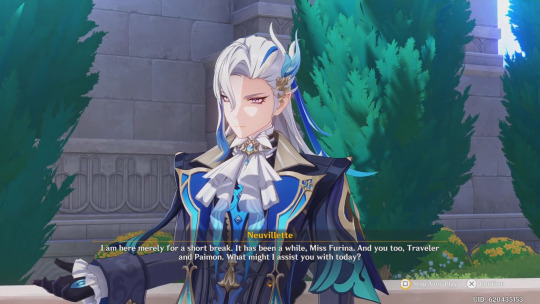

A little clarification on how Neuvillette addresses Furina in her story quest—in English it's rendered as "Miss Furina," and shortly after "Lady Furina," implying he uses a different honorific each time.
However, in both these lines Neuvillette actually uses 女士/nǚshì, the same way he has always addressed Furina in the past, barring the instances where he only uses her name, which he only does in private and generally not to her face.
When Furina asks the NPCs in the quest to stop calling her "Lady Furina," they switch from 大人/dàrén to calling her 女士/nǚshì/Miss Furina. Previously Neuvillette was the only character who called her that. When he did, it was always rendered in English as "Lady Furina," the same as the other more reverent honorific.
So no actual change between them in this regard, just the translation team finding themselves in a bit of a bind over how to translate it going forward where the two are concerned!
#furina#neuvillette#genshin impact#neuvifuri#focallette#this isn't really meant as a ship post unlike my usual fare but since it's of interest i shall tag anyways. anyone is welcome to enjoy.#you really gotta check the chinese to parse exactly how furina is addressed cos idt any of the other languages catch all the nuances of it#ex. japanese has both neuvillette and the knave calling furina 'dono' when the knave uses a different term from nv in chinese (xiaojie)#i dont claim to speak the language nor fully understand the implications of each honorific but even just knowing where there's a difference#is very enlightening. one of these days i'll finish up the draft i have compiling how each character addresses furina#i haven't checked the act v dialogue to see how neuvillette addresses furina there btw. all in good time.#genshin impact spoilers#furina story quest spoilers
233 notes
·
View notes
Text
The thing is. Bad/gross food is rarely a DISH - when food is bad it's because it's been badly made, whether because of skills or available ingredients. but a dish p much only exists recognisably and has a name because someone likes at least one version of it.
which is to say. there isn't really a way of naming a dish, school of dishes or specific food culture and going EW ISN'T THIS DISH UNILATERALLY CONCEPTUALLY DISGUSTING without denigrating quite a lot of people.
like you don't have to like it in any form. but it's eaten and shared because it's good to a not insubstantial number of people when cooked right.
(and I don't really understand how you approach that with total incuriosity when it's a dish you haven't tried like. ARE rocky mountain oysters good? Maybe! I would very much eat some to find out!!!!)
this is actually something the British food poll did in a way the American ones I've seen haven't really - they described how the food they're imagining is, specifically, badly prepared (grey meat and veggies; unseasoned shepherd's pie). which is wildly tipping the scales by calling it British Food but. like. that is an on point definition of why that food is gross.
(this also applies to American chocolate, which like. Broad category but I think most of us understand this refers to low-cocoa high-sugar chocolate, probably with bucolic acid. so we are being invited to imagine Badly Made Chocolate not. the concept of chocolate)
personally I just think it's very rarely a good or funny idea to shittalk how gross any given food culture is. partly because food is important and culturally evocative for most people, partly because it's very...alienating? to be like WHO COULD EAT SUCH A THING? just because you wouldn't, and largely because to be frank it says more about you than about the food that you have so little imagination or curiosity that you can't imagine why a food might be enjoyable to folks who aren't you.
yes this includes jello salad, I would like to try it. ONCE. if it wasn't appealing to someone it wouldn't be so widespread.
#red said#like. as if talking shit about people for eating offal or offcuts particularly hasn't always been hugely loaded in race and class terms#ewww can you believe filipinos eat tripe. can you believe Chinese people eat pig feet?#YEAH I CAN AND YOU SHOULD TOO. Those are normal parts of an animal to eat and it's weird that you think it's weird#but it's also. a really common racist trope right? like. how often does racist rhetoric mention food being 'weird' or 'smelling bad'?#because shitting on someone's food and calling it gross is a really good shortcut to shitting on them and their cultures#implying they're dirty or animalistic or cruel or undiscerning or have bad taste#this isn't crying RACISM AGAINST WHITE PPL btw#just saying. maybe in general we should shut the fuck up about finding entire schools of cooking gross#and it's interesting you know. bc Americans in the notes of the American food posts recognise there are race and class sensitivities there#but not that there might be similar sensitivities around mocking another country's food
953 notes
·
View notes
Photo

I’m being SO normal about these leaked ling and lan fan alts for the fma mobile game definitely am not completely obsessed loosing my shit over these no siree
#jk i'm screaming#catch me trying to six star these without actually spending real world money#with the new mechanics as long as i get one of each it's doable!!#it just takes like 8 months of daily grinding but!! doable!!#anyways the common guess is these are for chinese new year but some folks are saying the new update shouldn't have content for that far out#so could be the second half of the holiday event? who knows#and also who cares LOOK AT THESE SKINS#fma#fma mobile#ling yao#lan fan#humming-rambles#(also i know they're probably alts not skins but that's just the term i use more often lol)
434 notes
·
View notes
Text
音系学,音位学 - Phonology
音位学分析 yīnwèixué fēnxī - phonological analysis
音系表征 yīnxì biǎozhēng - phonological representation
心里表征 xīnlǐ biǎozhēng - mental representation
抽象表征 chōuxiàng biǎozhēng - abstract representation
单位 dānwèi - units
音段 yīnduàn - segment
音节 yīnjié - syllable
音节首 yīnjiéshǒu - onset
音节核 yīnjiéhé - nucleus
音节尾 yīnjiéwěi - coda
音拍 yīnpāi, 莫拉 mòlā - mora
音步 yīnbù - foot
莫拉理论 mòlā lǐlùn - moraic theory
音节长度 - syllable length
音位 yīnwèi - phoneme
最小对立体 zuìxiǎo duìlì tǐ - minimal pair
区别意义 qūbié yìyì - distinguish meaning
对立的 duìlì de - contrastive
边缘对立 biānyuán duìlì - marginal contrast
音位中和 yīnwèi zhōnghé - phonemic neutralization
音位变体 yīnwèi biàntǐ - allophone
环境 huánjìng - environment
条件变体 tiáojiàn biàntǐ - conditioned variant
自由变体 zìyóu biàntǐ - free variation (无条件变体)
预测 yùcè - predict
互补分布 hùbǔ fēnbù - complementary distribution
自然类 zìrán lèi - natural class
在一定条件下产生 "produced under certain conditions" (产生 chǎnshēng "give rise to, produce")
在其他实词中都呈现互补分布。"They all present complementary distributions in other content words."
如果有一群语音共享一个或多个发音或听觉特征,而且同一个语言的其他音没有,这群语音就组成一个自然类。"If a group of sounds shares one or more articulatory or auditory features, which are not shared by the other sounds of that language, then that group of sounds is a natural class."
音位配列 yīnwèi pèiliè, 语音组合法 yǔyīn zǔhé fǎ - phonotactics
规则 guīzé - rule
替换 tìhuàn - substitute, replace
语音同化 yǔyīn tónghuà - assimilation
语音异化 yŭyīn yìhuà - dissimilation
语音省略 yǔyīn shěnglüè - deletion, elision
插音 chāyīn - epenthesis, insertion
语音变换 yǔyīn biànhuàn - metathesis
补偿延长 bǔcháng yáncháng - compensatory lengthening
连音 liányīn- sandhi, liaison
变调 biàndiào - tone sandhi
底层表达 dǐcéng biǎodá - underlying representation (底层形式 dǐcéng xíngshì, 底层表现 dǐcéng biǎoxiàn)
表层表现 biǎocéng biǎoxiàn - surface form
自主音段音系学 zìzhǔ yīnduàn yīnxìxué - autosegmental phonology
特征 tèzhēng - feature
音层 yīncéng - tier, level (as used in phonological context)
自主音段音系学理论把不同的区别性特征放在不同的音层上。
超音段 chāoyīnduàn - suprasegmentals
韵律 yùnlǜ - prosody
语调 yǔdiào - intonation
音高 yīngāo - pitch
响度 xiǎngdù - loudness
重音 zhòngyīn - stress, accent
节奏 jiézòu - rhythm, timing
重音节奏 zhòngyīn jiézòu - stress-timed
音节节奏 yīnjié jiézòu - syllable-timed
音拍节奏 yīnpāi jiézòu - mora-timed
表征的模型 biǎozhēng de móxíng - representation models
样本理论 yàngběn lǐlùn - exemplar theory
自下而上的过程 zìxià'érshàng de guòchéng - bottom-up process
自上而下的过程 zìshàngérxià de guòchéng - top-down process
优选论 yōuxuǎn lùn - Optimality Theory
制约排列 zhìyuē páiliè - constraint ranking
忠实性制约 zhōngshí xìng zhìyuē - faithfulness constraint
标志性制约 biāozhì xìng zhìyuē - markedness constraint
候选项目 hòuxuǎn xiàngmù - candidate
其他啊啊啊 (other)
范畴性的 fànchóu xìng de - categorical
阶层性的 jiēcéng xìng de - gradient
感知 gǎnzhī - perceive
发音 fāyīn - produce (sound), pronounce, enunciate
#中文#汉语#mandarin#mandarin studyblr#langblr#chinese langblr#词汇#chinese vocab#mandarin vocab#vocab#I’ve been sitting on this post for like a year now cuz I couldn’t find translations of a few more terms I wanted#alas#idk I just wanted to post it finally and probably make another one for vocab abt syntax lol#since apparently that’s what my thesis is#and I’ve been talking a lot w a classmate who’s doing hers on Chinese syntax#fun stuff#linguistics#语言学
35 notes
·
View notes
Note
Why orange? 🍊
It’s the lesbian fruit/srs
Okay actually it’s just because on her first sketch she wore a sweater with orange pattern and she’s holding a knife, so I used Orange Knife as a place holder name
Then I never changed it because I suck at naming
Her name is OK now
#ask#orange knife#orange is not the lesbian fruit#it’s tangerine#it’s a term often used in Chinese media
54 notes
·
View notes
Note
I've been writing my own sci-fi universe on and off after new Trek disappointed me, and has continued to disappoint me. If I had to sum it up it would be Star Trek but more overtly communist and also military sci-fi.
I've mainly been inspired by things I've read/played/watched, which has mainly been made by white or western creators, so I wanted to ask if you had any recommendations for sci-fi made by POC creators to broaden my horizons.
omg of course!!! (with the caveat that unfortunately non-Western scifi specifically is a bit of a blindspot for me, so most of these will be Western authors of colour)
Babel-17 by Samuel R. Delany
Dawn by Octavia E. Butler
Binti by Nnedi Okorafor (& i recommend reading the complete trilogy - imo it works best read together as one whole)
The Space Between Worlds by Micaiah Johnson
Stories of Your Life and Others by Ted Chiang
New Suns: Original Speculative Fiction by People of Color ed. by Nisi Shawl
How Long 'til Black Future Month? by N.K. Jemisin
I'm Waiting for You and Other Stories by Kim Bo-Young
And 2 that i personally haven't read yet but i think NEED to be mentioned, especially if we're talking space stories:
Ninefox Gambit by Yoon Ha Lee (also military scifi!)
An Unkindness of Ghosts by Rivers Solomon
also, short story anthologies!!! if you're looking for new authors or want to explore works from a specific culture/place, they're a great way to do that. here's a couple from my own reading list for this year:
Palestine + 100: Stories from a Century after the Nakba
Africa Risen: A New Era of Speculative Fiction
Readymade Bodhisattva: The Kaya Anthology of South Korean Science Fiction
Sinopticon: A Celebration of Chinese Science Fiction
& finally, i don't really watch a lot of tv/movies, but i do wanna wholeheartedly recommend:
Everything Everywhere All At Once
Janelle Monáe's Dirty Computer (free on youtube and an absolutely top tier example of afrofuturism)
Nope
They Cloned Tyrone
#this got WAY longer than i intended and it's still far from comprehensive#but. bolding the ones that i consider the BIGGEST must-reads/watches <3#if u wanna do some more exploring on ur own in terms of non-western sf:#i've noticed there's quite a lot of translated Chinese and South Korean SF in particular#or you could look up africanfuturism (which is a separate thing from afrofuturism!) and works that use that label#also: the tv adaptation of 3 Body Problem (aka probably the most iconic piece of Chinese scifi) is coming out in a couple weeks#so that might be worth keeping an eye out for! it's netflix though so idk how good/faithful it'll be 😐#i hope this is helpful and not too much info!
43 notes
·
View notes
Text
the sun can’t break the habit of going down
Posted on ao3: read here!
The world is burning, everything is falling apart, and in the middle of it all, Gem soars through the skies to find Pearl.
For the final time, that is.
— — —
(For @mcyt-yuri-week valentine’s day 4: Grief/Revenge)
#ender writes#gempearl#pearlgem#empireshipping#mcytyuriweekvalentines#empiresblr#empires gempearl doomed yuri walked so SL gempearl doomed yuri could run#mcyt fanfiction#mcyt#empires smp#empires s1#yeah. yeah TWO fics today crazy huh#this was such a productive week for me in terms of writing and absolutely nothing else#thank you chinese new year holiday for the free time i will NOT get this amount of time in the next two months
33 notes
·
View notes
Note
Hi! Why do so many BLs have one character meet the other when they were a child and love them since then…. I’m watching History 5 and the second couple has this trope with the older one loving the child but loads of them have a child ‘loving’ the older guy for years (Minato, second couple in History 4, lovely writer)
Is this a common trope in non-BL Asian dramas? Maybe I’m missing some cultural aspect but it makes me feel a bit weird… I’m fine when they both meet as children but when one’s a child and one’s an adult it feels off to me!
We Met As Kids, Therefore I Love You
Yes, it's a super common trope in ALL Asian romances.
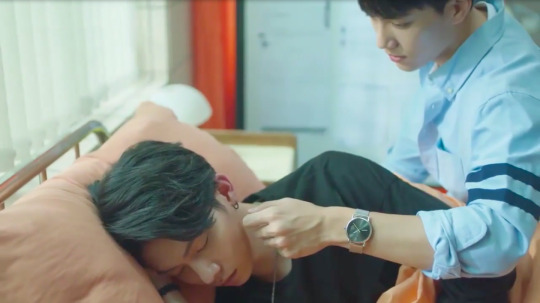
There's a human cross-cultural claim-to-care around having met someone "first" giving one person priority to another's affection and in their life.
For example, think about how many fans (of say a Kpop group or band or actor) will claim to be "better" or morally superior to other fans of that same talent, because they have have liked that group/person "since the beginning" or "before they were famous." How about those who claim superiority because they read the book before the TV series became popular?
To have loved something FIRST is often allied with being better at loving it, there is a value judgement to longevity of association. (This is also true around disliking someone/something first.)
There isn't a name for this logical fallacy, although there should be. I would say something like appeal to tradition argumentum ad antiquitatem (which is a red herring fallacy). So appeal to time, argumentum ad tempus?

(The 8th Sense is doing some VERY interesting things to philosophically battle this concept right NOW, actually.)
Narratively speaking, if you have only a short amount of time to unfold the story (for example We Best Love) this trope gives writers a quick way to justify pining and affection (usually from the seme character). So backstory can be cribbed for character development. That character is already in love, so we don't have to show him falling in love, only one character is in play for that.
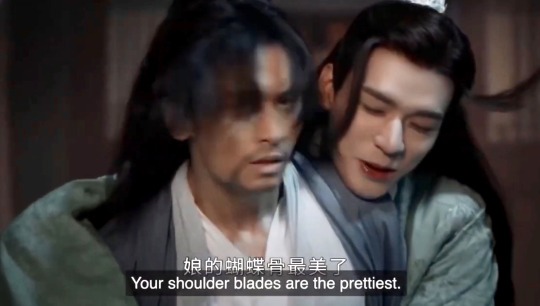
In longer narratives (like Word of Honor, Lovely Writer) this is a secret that gets to be slowly uncovered and explored as a plot point. If you have them meet as children, or when one is a child then it justifies one character not remembering the other (because peoples appearances change from childhood to adulthood).
I think the popularity in Asian dramas in particular has to do with collectivist cultures and family obligation/intimacy priority. To have known (or met) someone as a kid adds a level of intimate connection that justifies any affection that much more than meeting later in life.
There's a very funny scene in Kdrama (noona romance) Thumping Spike (recommended) that directly mocks this trope. Near the end the main couple openly together and they are in the car with the (former) love triangle dude. He lost, even though he's the one with the childhood crush. He directly combats this concept by saying (basically): If longevity guaranteed romance, I should be married to the grandma who runs my local convenience store.
Another well known Kdrama that combats this trope is Strong Woman Do Bong Soon (recommended) which goes out of its way to have the love triangle character who would normally lose the girl, actual win her this time. (So the one who loses is the moot crush from childhood.)
In BL, I tracked this one for a while:
Also here are a few BLs that DO NOT use this trope:
(source)
#asked and answered#Korean bl#childhood crush#long term pining#We Best Love#taiwanese bl#Strong Woman Do Bong Soon#Kdrama#KBL#Korean BL#Thumping Spike#Word of Honor#Chinese BL#bromance#the eighth sense#argumentum ad antiquitatem#appeal to tradition#logical fallacy
155 notes
·
View notes